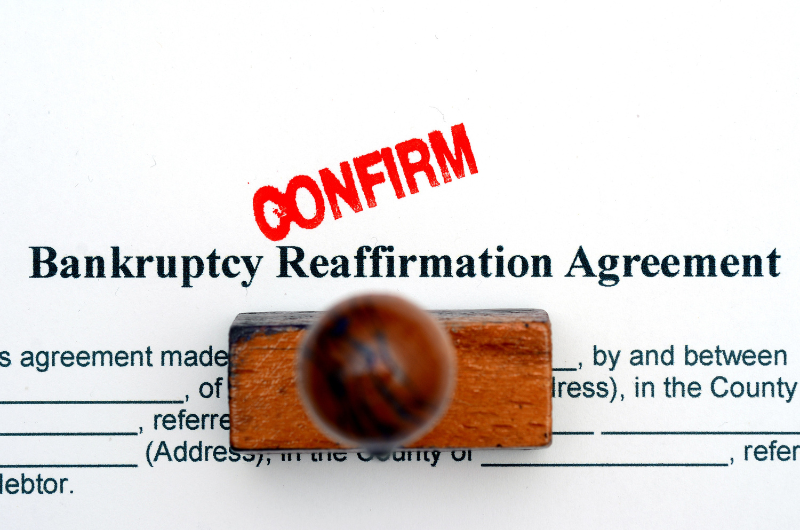


Reaffirmation v. Ride Through Option (aka Retain and Pay)
Prior to the enactment of the Bankruptcy Abuse Prevention and Consumer Protection Act (BAPCPA) in 2005, courts disagreed as to whether a debtor who wished to retain a vehicle in chapter 7 bankruptcy had to reaffirm the obligation or whether they could simply “retain and pay” without reaffirming. Congress attempted to resolve this problem through the 2005 amendments by essentially providing that the debtor either had to redeem the collateral by paying its value or enter into a reaffirmation agreement, effectively eliminating the “retain and pay” option.
Congress amended section 521 of the Bankruptcy Code to require debtors to choose between surrendering, redeeming, or reaffirming vehicle loans. Further, Congress enacted sections 362(h)(1)(A) and 362(h)(1)(B) of the Bankruptcy Code to provide for termination of the automatic stay if the debtor failed to state a proper intent with respect to the vehicle or failed to timely perform that stated intent. By adding these sections, Congress made it clear that if a debtor chose to “retain and pay”, the vehicle would no longer be protected by the automatic stay.
However, with those amendments, it was clear that even if the debtor failed to redeem or reaffirm the obligation and the automatic stay terminated, the credit union could only repossess the vehicle if there was a default.
Debtor attorneys argued that so long as the debtor was current on the payments and maintained insurance on the vehicle, the loan was not in default and the credit union could not repossess the vehicle. Conversely, credit unions argued that the debtor was in default simply due to the bankruptcy filing.
Default Upon Bankruptcy Clauses
Many credit unions include in their loan agreements a “default upon bankruptcy” clause which provides that the debtor will be in default if they file bankruptcy. The question is, are these clauses enforceable? If default upon bankruptcy clauses are not enforceable, debtors may ignore the bankruptcy rules requiring redemption or reaffirmation and may simply retain and pay so long as there is no other default. If default upon bankruptcy clauses are enforceable, credit unions may declare a loan in default and repossess a vehicle even if the loan is current.
Very few states have laws that prohibit declaring a loan in default based upon a bankruptcy filing. In states wherein these default clauses are prohibited, it is clear that a debtor can “retain and pay.” Up until recently, and as discussed below, California did not prohibit default under bankruptcy clauses.
Along with the 2005 amendments to the Bankruptcy Code, Congress enacted section 521(d) which provides that if the debtor fails to timely state and perform their intention as required, nothing in bankruptcy law prohibits the credit union from enforcing a default upon bankruptcy clause. Accordingly, following the 2005 amendments to the Bankruptcy Code and the lack of an outright prohibition under California state law, California credit unions have been able to treat the act of filing bankruptcy as a default under the credit agreement, which has made it easier for credit unions to obtain reaffirmation agreements.
California Senate Bill 1099
California Senate Bill 1099, which became effective January 1, 2023, made amendments to the Automobile Sales Finance Act (ASFA), specifically to section 2983.3 of the California Civil Code. These changes have effectively done away with the enforceability of “default upon bankruptcy” clauses in conditional sales contracts governed by the ASFA and thus may have restored the ride through or “retain and pay” option in California.
California Civil Code § 2983.3(a)(2) states:
Neither the act of filing a petition commencing a case for bankruptcy under Title 11 of the United States Code by the buyer or other individual liable on the contract nor the status of either of those persons as a debtor in bankruptcy constitutes a default in the performance of any of the buyer’s obligations under the contract, and neither may be used as a basis for accelerating the maturity of any part or all of the amount due under the contract or for repossessing the motor vehicle. A provision of a contract that states that the act of filing a petition commencing a case for bankruptcy under Title 11 of the United States Code by the buyer or other individual liable on the contract or the status of either of those persons as a debtor in bankruptcy is a default is void and unenforceable.
With these amendments to the ASFA, it is clear that a credit union may no longer declare a contract governed by the AFSA in default simply based upon a bankruptcy filing. As a result, it appears that the “retain and pay” or ride through option has been restored in California with respect to conditional sales contracts governed by the ASFA (i.e., indirect loans).
It is the author’s opinion that these amendments only affect conditional sales contracts governed by the ASFA (i.e., indirect loans) and do not apply to direct loans made by credit unions on credit union paper. However, debtor attorneys are using these amendments under the ASFA to argue that the “default upon bankruptcy” clauses are also not enforceable for direct loans as well.
While I don’t believe that those arguments have any merit, it’s possible that a judge says differently, or that California enacts similar legislation to eliminate “default upon bankruptcy” clauses in their entirety.
Unfortunately, now that it appears that a debtor may simply “retain and pay” with respect to indirect loans, credit unions may find it difficult, if not impossible, to obtain reaffirmation agreements for their indirect vehicle loans. Moreover, credit unions might also find it more difficult to obtain reaffirmation agreements for their direct vehicle loans, which is something that credit unions should prepare for going forward.
Article by John Mendonza, attorney at Moore, Brewer & Wolfe.
2855 East Guasti Rd., Suite 202
Ontario, CA 91761
909.212.6000
1201 K. St., Suite 1050
Sacramento, CA 95814-3992
916.325.1360
c/o Great Basin FCU
9770 South Virginia Street
Reno, NV 89511-5941
202.638.5777 www.cuna.org
www.dfpi.ca.gov
Clothilde “Cloey” V. Hewlett — 415.263.8500
fid.state.nv.us
702.486.4120 (Las Vegas)
775.684.2970 (Carson City)